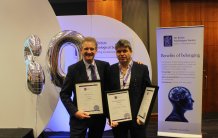
Professor Huw Williams and Dr Phil Yates
Exeter psychologist receives prestigious award for Research in Traumatic Brain Injury
A leading Clinical Neuropsychologist from the University of Exeter has received a prestigious award for his work.
Professor Huw Williams won the British Psychological Society’s (BPS) Barbara Wilson Award – the highest UK professional award for clinical neuropsychologists.
His recent work examined the links between traumatic brain injury (TBI) and crime, with the results influencing Parliamentary debates and government policy, in the UK and overseas. He had previously shown how survivors of TBI can often develop mood disorders - such as post-traumatic stress - and developed new approaches to treat survivors.
At an event in London, Professor Williams and Exeter colleague Dr Phil Yates were both awarded BPS Fellowships.
“It’s wonderful to receive this lifetime achievement award from the BPS,” said Professor Williams.
“It’s especially nice to receive the Barbara Wilson Award because Barbara has been fundamental in changing services for people with brain injuries in the UK and internationally. To give them more hope to get back to work, and have a good family life. And our work, I hope, adds to her achievements.”
Speaking about his work on TBI and crime, Professor Williams added: “The perpetrators of crime are often – at some early point of life – victims themselves.
“Our research has showed that TBI is linked to cognitive and emotional problems, violence and drug misuse and higher levels of incarceration.
“We also showed it was possible to intervene in prisons through brain injury screening and having brain injury “link workers”. It’s heartening that policy makers and the judiciary have been keen to implement our findings. Hopefully to help people can turn their lives around, and, maybe less crime”.
Dr Phil Yates and Prof Williams, BPS Fellowship recipients, have, as Co-Directors of the Centre for Clinical Neuropsychology Research (CCNR), brought clinicians – from the RDE Hospital - and scientists and post-graduate students from the University – to work on developing a better understanding of the causes of TBI, especially in childhood, and its effects on schooling, and the need for services to be developed. But also how staff, in the NHS, who manage trauma, need to be supported.
Dr Yates, who has also supported national initiatives in clinical neuropsychology training and continued professional development for the BPS Division of Neuropsychology said: “I am delighted to have received this award which is in part testimony to the collaborative approach to research we have undertaken in Exeter to better understand the longer term needs of young people who have sustained significant head injuries at an early age.
"We have been able to strengthen links for a range of research projects in a number of areas including mild traumatic brain injury and concussion disorders, brain injury rehabilitation, and the psychological well-being of emergency medicine staff.”
Date: 28 January 2019
